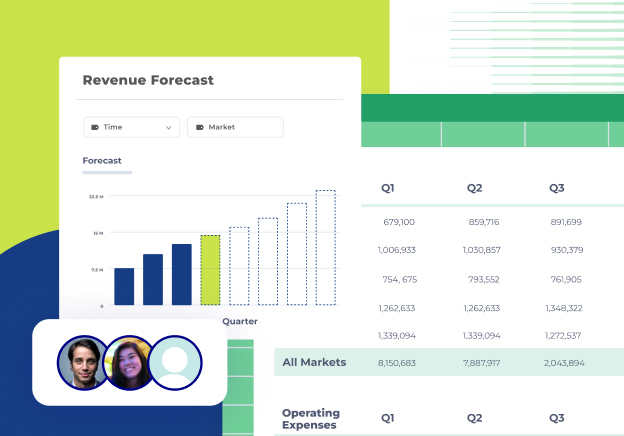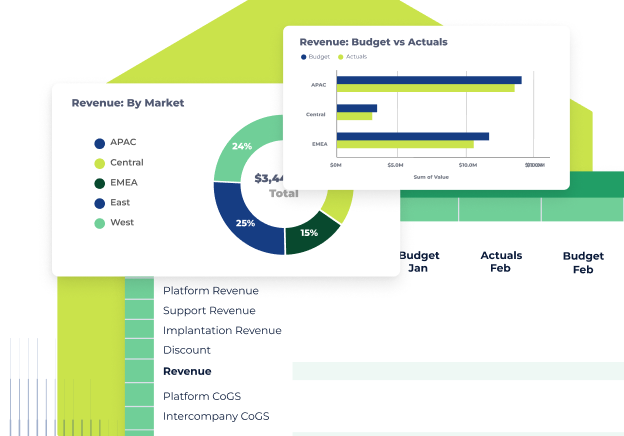Will AI replace humans in finance?
AI won't replace entire finance jobs like financial analysts or accountants, but it will take over specific tasks. For instance, AI can handle data entry, transaction processing, predictive analytics, and fraud detection.
However, finance roles still need human skills—especially for complex issues like strategic planning and client communication. AI will assist by taking care of repetitive tasks, allowing finance professionals to focus on responsibilities that require human expertise.
How does AI in finance work?
AI in finance uses advanced algorithms and machine learning models to process vast amounts of data. Finance teams can use artificial intelligence to:
- Generate insights and unlock value from data for faster decision-making
- Quickly detect anomalies, such as fraudulent transactions, financial crime, spoofing in trading, and cyber threats
- Automate routine tasks like account reconciliation, freeing up time for more strategic work
- Optimize investment strategies by analyzing market trends and modeling forecasting outcomes
- Enhance customer experiences through personalized financial services and support
The rise of AI in the finance industry
The rise of AI in finance has significantly impacted the industry, with AI expected to save the financial industry $1 trillion by the end of 2030.
One notable area where AI has transformed finance is algorithmic trading. AI algorithms can analyze vast amounts of data in real time and make informed trading decisions, even outperforming human traders.
They can also help with fraud detection and monitoring financial compliance. Machine learning algorithms can detect patterns and anomalies in financial transactions, helping to identify and prevent fraudulent activities quickly and effectively. This has helped financial institutions save significant amounts of money and maintain the trust of their customers.

Benefits of integrating AI into your finance team
Debating about using AI to support your finance teams? Here’s why you might want to:
Reduced manual work
Financial processes often involve repetitive tasks such as data entry, transaction processing, and report generation. This can be time-consuming due to the manual effort required and the potential for human error.
AI can automate these tasks, enabling finance teams to focus on higher-level strategic activities rather than getting slowed down by routine work.
Cost optimization
Integrating AI into your finance teams offers substantial cost optimization.
For example, Deutsche Bank recently announced a multi-year innovation partnership with NVIDIA to embed AI into its financial services, including intelligent avatars, speech AI, fraud detection, and risk management. This collaboration slashed the total cost of ownership by 80%.
Improved accuracy
The finance industry requires accuracy in data processing and analytics; a small error can lead to financial and regulatory problems.
AI minimizes human involvement in data-heavy processes. It can process vast amounts of data with more precision than humans often can, which helps make sure that financial reports, forecasts, and analyses are accurate and reliable.
Why AI won’t completely take over finance jobs
While AI algorithms can analyze and process large amounts of data, they struggle to accurately assess and interpret market trends, geopolitical events, and regulatory requirements.
They also lack the ability to make judgment calls in uncertain situations and understand the broader economic impact of financial decisions.
For instance, in the context of mergers and acquisitions, AI isn’t equipped to handle the negotiation skills, cultural understanding, and ability to foresee potential synergies or conflicts between merging entities that human professionals bring to the table.

How to use AI to complement the work of your finance team
Finance teams that leverage AI can optimize cost, reduce manual work, and improve accuracy. Let's explore how you can use AI to complement the work of your finance team:
1. Perform an AI gap analysis
An AI gap analysis involves:
- Assessing your organization’s current use of AI
- Identifying areas for improvement
- Determining opportunities for new AI implementations
Start by evaluating existing workflows to identify time-consuming, error-prone, or repetitive tasks, such as data entry, transaction processing, and report generation. Once you’ve mapped out these processes, consider which ones AI can automate.
This analysis will help you pinpoint where AI can make the most impact, freeing up your team to focus on strategic activities that drive business growth.
2. Encourage a growth mindset
As AI continues to evolve, your finance team needs to grow alongside it. Encouraging a growth mindset within your team means fostering a culture of continuous learning and adaptation.
Provide opportunities for finance team members to learn AI-related skills, such as data analysis, machine learning basics, and effective use of AI-powered finance tools. As your team grows their AI expertise, they’ll be better equipped to harness AI’s potential, stay ahead of industry trends, and add value to the organization.
3. Rely on human expertise
While AI can automate routine tasks and provide advanced data insights, human expertise remains irreplaceable in finance. We need human brains and experience to navigate complex financial scenarios, interpret nuanced market trends, or understand the emotional and psychological aspects of financial decisions.
Human professionals bring critical thinking, creativity, and a deep understanding of the broader economic and cultural contexts that AI just can’t replicate. Rely on your team’s expertise to make judgments in uncertain situations, manage client relationships, and ensure that financial decisions align with ethical standards and long-term goals.
AI should complement—not replace—the invaluable skills that your FPA team offers.
AI is an ally for your finance team
As your finance team adapts to the changing landscape, it’s important to see AI as an ally, not a threat. Artificial intelligence empowers your team by automating routine tasks, cutting costs, and boosting accuracy.
But the real power comes from combining AI’s strengths with the expertise of your finance professionals. This lets your team focus on strategic decisions, solve complex problems, and build stronger client relationships.
AI doesn’t replace human professionals; it enhances their work. When used effectively, AI supports your team and makes your financial operations more efficient, resilient, and innovative.
Ready to step into the future of finance? Cube’s AI-powered FP&A software is here to help. Request a free demo today.



.png)









.png)

.png)



.png)
.png)
![AI for FP&A: The complete guide [2025]](https://www.cubesoftware.com/hubfs/EBook%20Cover%20(32).png)